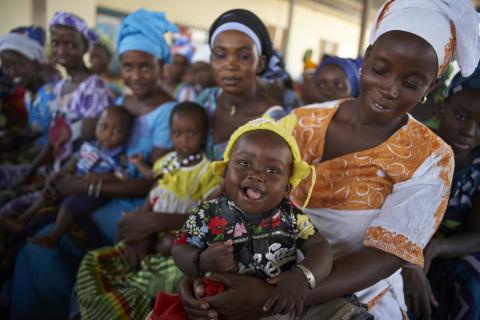Nigeria: Why 43% birth registration is not enough (Photo credit: UNICEF)
When the United Nations Children’s Fund (UNICEF) declared recently that about 57 per cent of Nigerian children under the age of five years do not have birth certificates, it raised more than an eyebrow. This is considering that the multifaceted efforts that were especially spearheaded by UNICEF in the past years are supposed to have yielded far more than the somewhat measly percentage.
It is generally accepted that 43 per cent of children that have birth registration is a low mark by any standard that can be used for measurement. Globally, the births of 166 million children under 5 have never been recorded. In the same vein, children in Africa, with only 44 per cent of them registered at birth and millions of deaths uncounted each year, have the lowest birth registration rate in the world. Strikingly, Nigeria alone accounts for 11 per cent of unregistered children in West Africa; considered as an unacceptably high percentage.
Perhaps, it needs no emphasis to say the birth registration of children is required for access to health, education and other services as well as allows accurate estimation of age. While it helps to reunite separated children and parents, evidence also shows it can provide important population information for planning services. More importantly, birth registration is recognised as a right of all children.
Demand factors such as socio-economic status, parental education, religion, ethnicity, maternal age and marital status have been found to be related to birth registration. So are supply factors such as geographic distance to registration facilities, in addition to mixed factors such as urban/rural location, attendance for antenatal care, place of birth and skilled birth attendance. In Nigeria, for instance, the National Population Commission (otherwise called NPopC) makes birth registration compulsory by Act Number 69 of 1992 which established the commission, which also makes the registration a condition for school enrolment and a requirement for obtaining a job in the public service.
Advertisement
Despite the exercise being made compulsory by law, however, birth registration in Nigeria has remained low. Figures show that 2013 Demographic and Health Survey (DHS) reported that 30 per cent of children less than five years old had their births registered. Multiple Indicator Cluster Surveys (MICS) reported birth registration rates among Nigerian children less than five years old of 23 per cent in 2007 and 42 per cent in 2011. In 2013, 57 per cent of birth registrations took place at NPopC centres, 13 per cent at local government area offices and 22 per cent at private clinics or hospitals.
Essentially, birth registration is a function of local government, although lack of financial and human capacities, lack of input into resource allocation decisions, lack of adequately qualified personnel, and widespread corruption have proved a huge stumbling that set progress backward.
A UNICEF report however recommended some strategic approaches for strengthening birth registration in Nigeria. One of the recommendations is to integrate birth registration more closely with health services, including incorporating birth registration into child health weeks, training community health workers to register births, and instructing health workers to register children during child health campaigns. Cross River and Bauchi states, for instance, have been found in recent years to improve birth registration by collaborating with their states’ ministries of health.
Advertisement
In 2011, the Cross River government specifically began training health workers in government facilities to act as registrars and issue permanent birth certificates; just as the NPopC in Cross River also trained teachers in primary schools as birth registrars, so that any child enrolling without a birth certificate can be registered at the school and to set up programmes of advocacy for birth registration with local government staff, targeting LGAs with low birth registration during health weeks and providing extra staff during these weeks. In Bauchi, the NPopC held LGA workshops to improve birth registration coverage and to partner with the state ministry of health to train health workers to register children in government health facilities.
Successes in both Cross River and Bauchi have not barred challenges in other states across Nigeria. A former NPopC’s chairman, Chief Eze Duruiheoma raised the alarm in an interview in 2021: “The 4,000 birth registration centres in Nigeria are grossly inadequate to effectively register all births across Nigeria.” NPopC’s Director in Anambra State, Mr. Joachim Ulasi, also lamented recently that the commission lacks enough manpower for birth registration: “We have only 148 registration centres across the state, comprising 21 controllers who are deputy chief registrars for the 21 local government areas. If they are removed from the 148, we are left with 127, which are located in health facilities throughout Anambra State. We have 181 autonomous communities and we need at least one centre in each community while the large communities should have two or more.” Although Ulasi offered a flicker of hope that the commission had concluded plans to digitalise the birth registration exercise in Anambra State, it remains to be seen. Even amidst the hope, a Child Protection Specialist in charge of UNICEF Zone A Field Office in Enugu, Mr. Victor Atuchukwu, said: “It is the right of every child to have a birth certificate, but many parents did not consider it important. Without a birth certificate, time would come when the child would discover that he or she had no official record of vital information.”
But it is believed that the Civil Registration and Vital Statistics (CRVS) would help to steady the course of birth registration in the years ahead if all efforts are geared in that direction, considering assurances from the UNICEF Nigeria Country Representative. Peter Hawkins: “We must ensure that we count every child so that they can best benefit from important services like health and education. Functional systems that allow for the sharing of data across information management databases that are integrated with other vital services are necessary to push the birth registration rate in Nigeria up, and make sure every child is counted.” Already, the National Population Council (NPC) has identified information and communication technology assets to support effective CRVS systems that are integrated with other governmental systems such as health and identity management. This will ensure the highest standards of data protection and confidentiality of personal data to promote birth registration among civil registration, health, and identity management systems.
The United Nations Sustainable Development Goals (SDGs) Target 16.9 calls for governments to provide legal identity for all, including birth registration by 2030. The indicator for the target is the “proportion of children under 5 years of age whose births have been registered with a civil authority, by age.”
Advertisement
Concerns over the lopsidedness in birth registration in Nigeria, which records the highest for Lagos State (94%) and Federal Capital Territory (87%) and lowest for Jigawa State (23.6%) and Sokoto State (25.5%) led the Child Rights Information Bureau (CRIB) of the Federal Ministry of Information and Culture, in collaboration with UNICEF, to recently organise a two-day Media Dialogue on Multiple Indicator Cluster Survey (MICS 6) results where journalists were appraised with development on birth registration in Nigeria and guided on how to contextually report same to the public. Participants were unanimous that the shortfall in the country’s birth registration must be filled in the interest of genuine progress and development.
Photo credit: Noorani/ UNICEF
Add a comment







